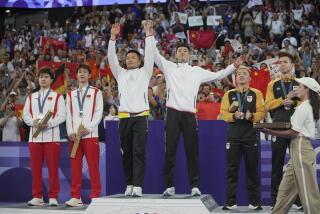Victory at Last for Chinese
- Share via
SHANGHAI — While much of the world was focused on events in Afghanistan, China was lost in euphoria Sunday, celebrating its long march toward the World Cup finals.
The Chinese soccer team’s 1-0 victory over Oman in the northeastern city of Shenyang ended more than four decades of national failure and heartache. China finally earned the right to compete against the best soccer players in the world when the games resume next year in Japan and South Korea.
For the Chinese, it was a milestone no less profound than the success of its arduous bids to host the 2008 Olympics and enter the World Trade Organization.
In fact, the reaction to Sunday’s victory was much more emotional. Soccer has become a national obsession. A patriotic cause. Repeated defeats and near misses have not only bruised China’s collective ego but provoked violent protests from fans who cannot understand why the most populous nation on Earth could not come up with 11 good men to realize one dream.
Sunday night, their luck turned, and spontaneous celebrations burst out across the country--as if, at last, China had shed the image of “the sick man of Asia.” National pride was at a fever pitch. Crowds waved Chinese flags, chanted the national anthem and shot off fireworks.
“It’s as if China just usurped the United States as the new king of the world,” said Wu Jianxin, an art teacher in Shanghai.
At prestigious Beijing University, students shouted, “Long live China!” A fan at a sports restaurant was so overjoyed that she could not stop sobbing. Motorists cruising through Tiananmen Square, in the heart of the capital, honked their horns and screamed from their windows. A pedestrian cheered, waving a poster of the late Chairman Mao. The players choked up after the game.
“We’ve shed so many years of bitter tears,” said Fan Zhiyi, China’s veteran defender, who played in three failed World Cup qualifying rounds. “Everything we did was for this moment.”
The miracle worker behind Sunday’s victory was not Chinese but Yugoslav. Bora Milutinovic is the only coach in the history of the game to have led five countries to the World Cup finals. The previous four were the U.S., Mexico, Costa Rica and Nigeria. At a news conference after Sunday’s victory, he said his goal was to help China break out of Asia and into the world. For that, he said, he is very proud.
But despite the coach’s “rent-a-World-Cup-victory” reputation, public opinion concedes that the Chinese team also got extremely lucky this year. A random draw spared it confrontations with the much stronger Asian teams known as the “Group of Death.” Those include Saudi Arabia, Iran and Iraq, which all have previous World Cup experience. Instead, China was pooled with the weaker Asian qualifying teams of Qatar, Uzbekistan, the United Arab Emirates and Oman.
Also out of China’s way were much tougher rivals Japan and South Korea, who automatically qualified for the finals because they are both host countries next year.
Otherwise, there might have been another humiliating defeat.
In 1982, for example, China was one step away from the finals in Spain when it lost to New Zealand at the last minute. In 1986, the then-British colony of Hong Kong defeated front-runner China on its home turf during the game’s last three minutes. Outraged fans reacted with bloody riots. In 1990, bad luck struck again during the final minutes. In 1998, more riots broke out because the tiny Persian Gulf nation of Qatar dashed China’s dreams.
After each of those painful losses, millions of fans vowed never to watch Chinese soccer again.
Even after Sunday night’s win, the widespread pride was tempered with a touch of disappointment that China had not played better than it did.
“They should have won at least by three goals,” said Qin Kun, an advertising executive from Shanghai. “Oman is the weakest team in the group.”
A more prevalent feeling is that Sunday’s might have been a one-time victory. China loves soccer and has the largest fan base in the world. But it does not have a long or deep tradition of playing the game. Developing talent has proved difficult, and players have minimal contact with skillful international competitors.
“We’ve waited 44 years for this,” said Zhou Li, who hosted a dinner party in Shanghai so his friends could watch the game on his large flat-screen TV. “But I’m worried it’ll be another 44 years before we could win like that again.”
More to Read
Go beyond the scoreboard
Get the latest on L.A.'s teams in the daily Sports Report newsletter.
You may occasionally receive promotional content from the Los Angeles Times.






